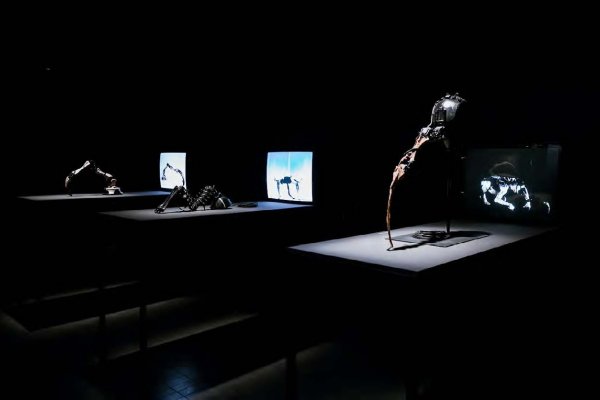The AI Prostheses

7 Configurations (2014-2019) is a cycle of performances and installations conceived by Marco Donnarumma and created in collaboration with a team of scientists, designers and performers. The cycle focuses on the conflicts surrounding the human body in the era of artificial intelligence (AI).
Through combined research on movement, dramaturgy, sound and technological engineering, each of the performances and installations in the cycle combines human bodies, robotic hardware, machine learning software and microorganisms into a particular ‘configuration’.
This exhibition presents the machines of the 7 Configurations: a skin-cutting robot with a steel metal knife, a facial prosthesis which blocks the performer’s gaze with a mechanical arm, and two robotic spines that function as additional limbs without a body. These robotic prostheses, uncanny combinations of the machinic with the organic, were created through a multi-layered, iterative process of collaboration between Donnarumma, designer Ana Rajcevic and artist-engineer Christian Schmidts. Starting from Donnarumma’s concept of “useless prostheses”, paradoxical objects designed for the body, but not to enhance it and rather to subtract functions from it, Rajcevic created a unique design for each of the machines, which were then engineered into life by Schmidts, Donnarumma and the Neurorobotics Research Laboratory:
Some of the machines are enveloped by bacterial biofilm cultured by Margherita Pevere. The prostheses have been created to act as performers with their own agency, that is, to interact with their fellow human performers without being controlled externally. To this end, the machines are embedded with biomimetic neural networks, information processing algorithms inspired by biological nervous systems. Programmed by Donnarumma with the scientific consultancy of the Neurorobotics Research Laboratory (DE), these neural networks endow the machines with artificial cognitive and sensorimotor skills.
Sensory data captured in real time by servo motors enable each prostheses to perceive its own body in space, as well as the bodies of the other performers, and improvise movements in response to external stimuli, such as touch, pressure, pull and torsion. As it moves, a prostheses learns about its partners and environment, constantly modifying its behaviour across time by improvising on its own or in interactions with human performers.
[Marco Donnarumma]
Amygdala, 2016-2018, robotic sculpture from stand-alone installation.
Media: Artificial skin, artist’s hair, epoxy, beeswax, FPGA computer board, custom AI software (adaptive neural networks, reinforcement learning algorithms), servo motors, 3D-printed body, aluminium chassis, steel metal knife.
Rei, 2018, facial robotic prosthesis used in the performance Eingeweide.
Media: Bacterial cellulose, FPGA computer board, custom AI software (adaptive neural networks, reinforcement learning algorithms), servo motors, 3D-printed body, aluminium chassis.
C, 2018, robotic spinal prosthesis used in the performance Alia: Zǔ tài.
Media: FPGA computer board, custom AI software (adaptive neural networks, reinforcement learning algorithms), servo motors, 3D-printed body, aluminium chassis.
Kooperation:
AI Prostheses Credits
Concept, research, biomechanics, AI programming: Marco Donnarumma
Visual design and research: Ana Rajcevic
3D modelling and printing: Christian Schmidts
Robotic engineering: Marco Donnarumma, Christian Schmidts
Additional programming: Alberto de Campo
Neurorobotics advisor: Prof. Manfred Hild
Microbial cellulose skin: Margherita Pevere
The AI prostheses have been created with the support of numerous co-producers and institutions, including Graduiertenschule at the Berlin U. of the Arts (DE), Berlin Centre for Advanced Studies in Arts and Sciences (DE), Einstein Stiftung (DE), Wissenschaft im Dialog (DE), Baltan Laboratories (NL), CTM Festival (DE), Chronus Art Center (CN), Retune Festival (DE), and Resonans Festival (DK).
